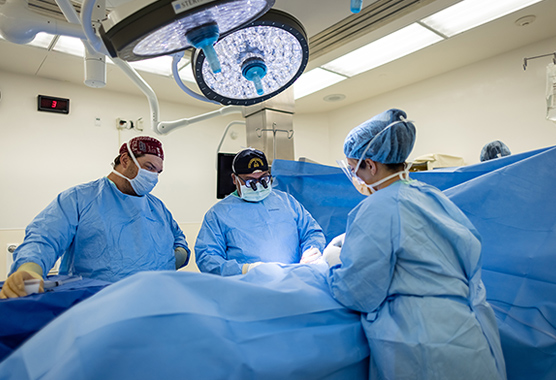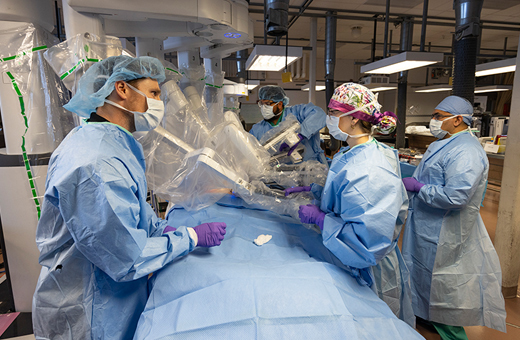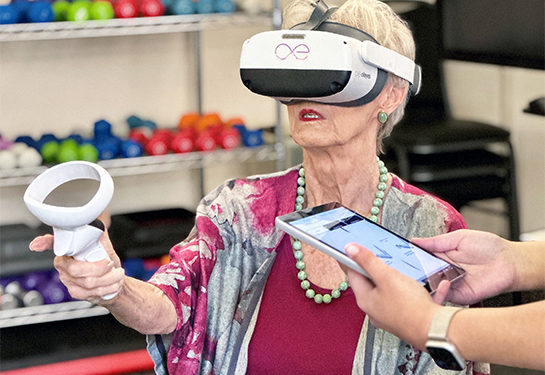Brain Tumor Surgery
We use the latest surgical techniques to treat all types of brain tumors. Our team delivers skilled, compassionate care tailored to your needs.
Medically reviewed by Orin Bloch, M.D. on Aug. 04, 2025.

Compassionate and Expert Treatment for Brain Tumors
Facing brain tumor surgery can feel overwhelming, and it’s normal to have questions. Our team is here to guide you with advanced care, clear information, and personalized support. Whether you’re preparing for surgery or exploring your options, we support you every step of the way.
Brain Tumor Surgery
We use state-of-the-art surgical techniques to treat many types of brain tumors, such as:
- Glioblastomas
- Astrocytomas
- Oligodendrogliomas
- Meningiomas
- Brain metastases
- Pituitary tumors
- Vestibular schwannomas
- Chordomas and other skull base tumors
We aim to protect your health and brain function and ease your symptoms. We’re experts in the following advanced procedures:
Asleep Craniotomy
During this open surgery to safely remove your tumor, you stay fully asleep under general anesthesia. Your brain health is protected using advanced technologies, including image-guided navigation and electrophysiologic monitoring.
Awake Craniotomy
When safe removal of tumors in critical brain regions controlling speech, movement, or other important functions needs to be ensured, it may be recommended that you stay awake. You feel no pain as you stay awake for part of the surgery so your team can safely monitor and protect brain function.
Gamma Knife
Gamma Knife delivers precise radiation to treat brain tumors without a traditional incision. You have local anesthesia and stay awake during the procedure. You go home the same day.
Laser Ablation or Laser Interstitial Thermal Therapy (LITT)
Laser ablation (LITT) uses targeted heat to destroy tumors through a tiny opening in the skull. This minimally invasive approach often means less pain and a faster recovery.
Minimally Invasive Surgery
Minimally invasive techniques use tiny openings and advanced tools to treat brain tumors with less impact on your body. This approach often leads to smaller scars, less pain, fewer risks and a quicker recovery.
Robot-Assisted Surgery
Robot-assisted surgery enables your surgeon to remove a brain tumor with greater precision through small openings. This technique helps protect healthy brain tissue and supports a smoother healing process.
Request an Appointment
As Sacramento's No. 1 hospital, you'll benefit from unique advantages in primary care and specialty care. This includes prevention, diagnosis and treatment options from experts in 150 specialties.
Referring Physicians
To refer a patient, submit an electronic referral form or call.
800-4-UCDAVIS
Patients
Call to make an appointment.
Consumer Resource Center
800-2-UCDAVIS
Your surgical team will take time to explain each step of the procedure and answer all your questions. We’re here to help you feel prepared, supported, and confident going into surgery.
-

Before Surgery
Before surgery, your care team will guide you through tests and help ease any worries you may have. We’ll make sure you understand what to expect and feel supported and ready for surgery.
-

During Surgery
During surgery, your team focuses on keeping you safe and comfortable. We use advanced tools and surgical techniques to treat your condition with precision.
-

After Surgery
Right after surgery, your care team will monitor you closely in a recovery room. We’ll check on your progress often, help with pain relief, and answer any questions you or your family may have. Many patients will remain in the hospital for a few days, spending time in the intensive care unit (ICU) or neurosurgery ward. Our specially trained neurosurgery nurses are there to ensure a safe and smooth recovery.
Home Care After Brain Tumor Surgery
Your healing continues at home, and it’s normal to have questions about what comes next. We’ll partner closely with you throughout your recovery.
Follow Your Care Team's Instructions
Your care team will guide you on taking medications as prescribed and caring for your incision. We’ll schedule follow-up appointments so we can support your recovery.
Give Yourself Time to Heal
Fatigue, mood changes, or trouble concentrating are common after brain surgery. Rest often and let your body and brain recover at their own pace.
Ask for Help
You'll need help with daily tasks while you're recovering. Support from loved ones is essential — and your care team is here for you, too.
When to Contact Your Neurosurgeon
Call your surgeon if you notice new or worsening pain, a fever, or changes around your incision like redness or drainage. Contact us if you have trouble breathing, feel unusually weak, or just don’t feel right. It's always better to reach out early — your team is here to help.

Ranked among the nation’s best hospitals
A U.S. News & World Report best hospital in cardiology, heart & vascular surgery, diabetes & endocrinology, ENT, geriatrics, neurology & neurosurgery, and pulmonology & lung surgery.

Ranked among the nation’s best children’s hospitals
U.S. News & World Report ranked UC Davis Children’s Hospital among the best in pediatric nephrology, orthopedics*, and pulmonology & lung surgery. (*Together with Shriners Children’s Northern California)

Ranked Sacramento’s #1 hospital
Ranked Sacramento’s #1 hospital by U.S. News, and high-performing in aortic valve surgery, back surgery (spinal fusion), COPD, colon cancer surgery, diabetes, gynecological cancer surgery, heart arrhythmia, heart failure, kidney failure, leukemia, lymphoma & myeloma, lung cancer surgery, pacemaker implantation, pneumonia, prostate cancer surgery, stroke, TAVR, cancer, orthopedics, gastroenterology & GI surgery, and urology.

The nation’s highest nursing honor
UC Davis Medical Center has received Magnet® recognition, the nation’s highest honor for nursing excellence.

World-class cancer care
One of ~59 U.S. cancer centers designated “comprehensive” by the National Cancer Institute.

A leader in health care equality
For the 13th consecutive year, UC Davis Medical Center has been recognized as an LGBTQ+ Healthcare Equality Leader by the educational arm of America’s largest civil rights organization.

